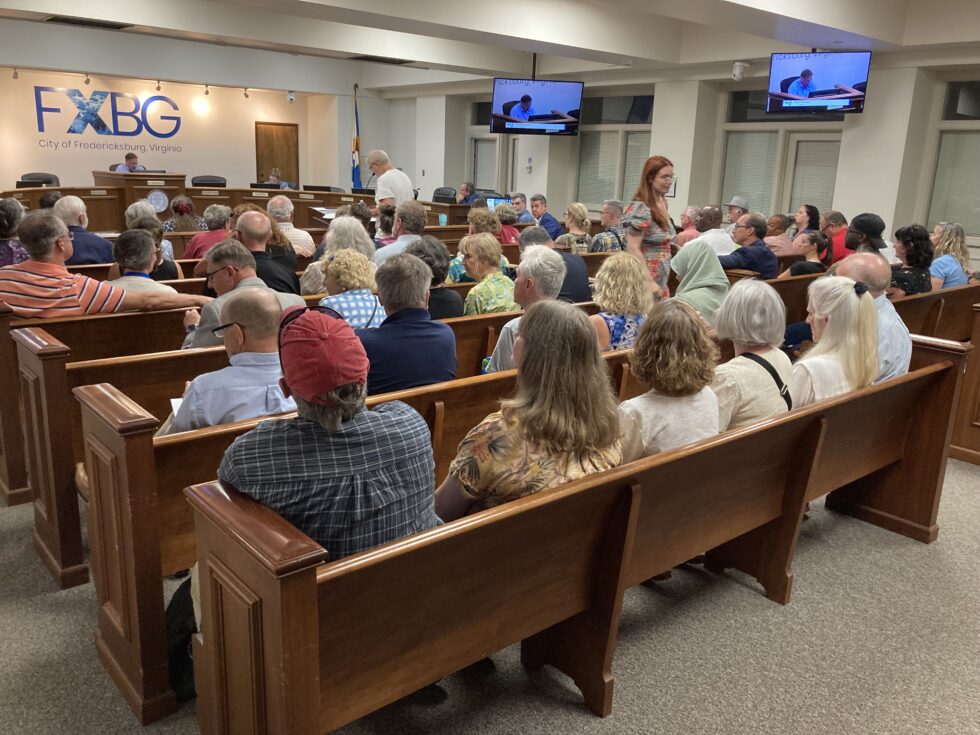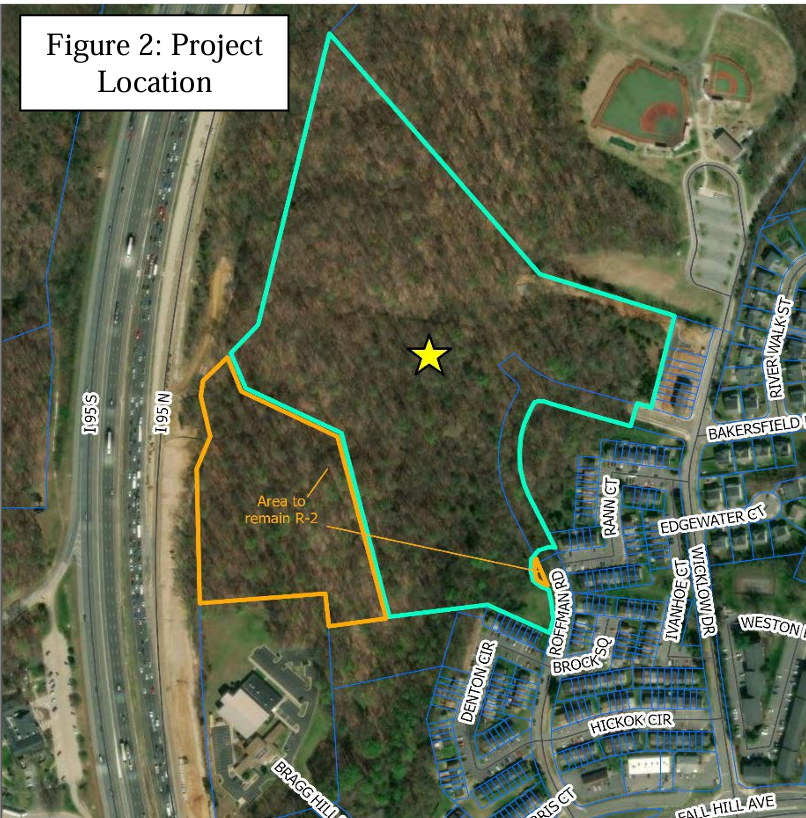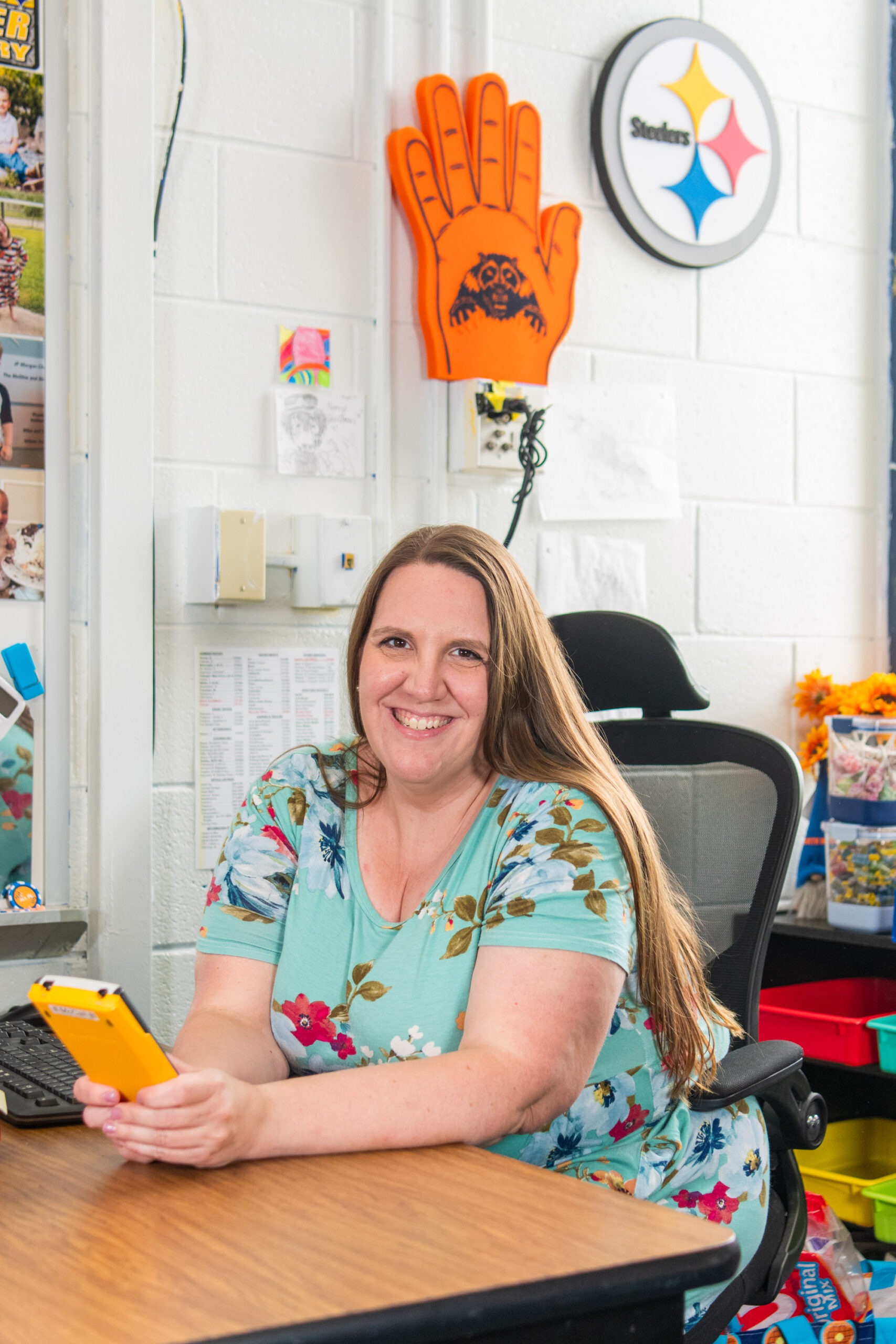
Project proposed by Micah Ministries, Virginia Supportive Housing, and Mary Washington Healthcare to provide housing and support for Fredericksburg’s unhoused population.
Area residents, as well as nonprofit and religious leaders, filled City Council chambers Wednesday night for the first public hearing on the Jeremiah Community, a proposed planned neighborhood with wrap-around services for those experiencing chronic homelessness.
“Tonight is a milestone in a 20-year journey,” said Meghann Cotter, executive director of Micah Ecumenical Ministries, which, together with Mary Washington Healthcare and Virginia Supportive Housing, has submitted multiple applications to the city to pave the way for Jeremiah Community.
Cotter said Micah has spent 20 years caring for the area’s unhoused population but has come to understand that “there has been something missing in our approach.”
People become homeless not when they run out of money, but when they run out of relationships, Cotter said. Fredericksburg can “functionally end street homelessness” by creating a “compassionate community” where people can forge relationships, live in the type of housing that suits their needs and abilities, and be surrounded by the supports they need to live a flourishing life.

The application seeks to rezone 31 acres in the Bragg Hill area of the city, north of Roffman Road and west of Bakersfield Lane, from R-2 Residential to Planned Development—Residential. It also seeks a special use permit for institutional housing.
The proposal is to construct 189 housing units—109 one-bedroom standalone units, averaging 450 square feet each, to be operated by Micah Ministries; and a multi-family building with 80 additional studio units, operated by Virginia Supportive Housing.
Tenants of all the units will be those “overcoming homelessness,” the application narrative states, “with priority for those who are chronically unhoused (i.e. displaced for one year or more and also have a disability).”
There will also be a medical facility which will provide primary, dental, and mental health care to residents.
The general development plan also calls for a community center that includes flexible gathering space, a computer lab, an exercise room, a full-service kitchen, staff offices, and a small laundry room; a maker’s space; a vocational training center; a chapel and memorial garden; and a “variety of green spaces and outdoor gathering spots” such as a community garden and dog park.
The proposed community is near several other neighborhoods along the Fall Hill corridor. According to the application narrative, residents of the surrounding neighborhoods would be able to use some of the ancillary amenities, such as the medical center, “when appropriate.”
“Focus groups with stakeholders, for instance, have revealed that a health center and connection to community resources are key needs in the surrounding neighborhoods,” the narrative states.
Roffman Road right-of-way, other concerns
The application also asks that the city vacate the right-of-way for 1.289-acres of an unbuilt section of Roffman Road connecting it to Wicklow Drive via Bakersfield Lane. The general development plan for Jeremiah Community proposes to build the medical clinic, community center, and a parking lot in that area.
Staff said the city’s comprehensive plan shows that a connection is needed between Roffman, which is currently maintained by the Bragg Hill Townhomes Homeowners Association, and Wicklow.
“The existing portions of Roffman Road do not meet city standards and need to be improved with any additional development at the end of the road,” the staff report states. “Improvements to Roffman Road are not currently proposed.”
The right-of-way question is one of several complexities that need to be worked out, staff said. Since the comprehensive plan shows that the Roffman Road extension is needed, the applicants either need to seek a comprehensive plan amendment or show compliance with the plan by either shifting the right-of-way instead of asking for it to be fully vacated or adding a proffer stating that right-of-way will be returned to the city if the institutional housing is not built.
Charles Payne, representing Micah and the other applicants, said he submitted revised proffers on Wednesday that state that the right-of-way will be dedicated back to the city if the development isn’t built or the use changes.
The updated proffer statement will be posted with the rest of the application early next week, Planning Director Charles Johnston told the Advance on Thursday.
Bryan Stelmok, Bragg Hill HOA president, said during the public hearing that the HOA’s attorney contests the city’s position that the unbuilt section of Roffman Road is a public right-of-way, instead arguing that it is a private road.
Stelmok also questioned why the applicants are proposing to put the Jeremiah Community in the Bragg Hill area, which is “already poor and underserved.”
“You are putting poverty into an area that is already poor,” he said. “How does this help the area as a whole?”
He suggested that the applicants chose the Bragg Hill location because it will generate the least amount of resistance from the surrounding residents.
Planning Commission Chair David Durham asked the applicants to come back to the next public hearing to address this argument, which he said is “convenient to some degree” but does have “some value.”
“You said you looked at 17 locations,” he said. “It would be interesting for you to go through how you ended up with this location. What were the criteria?”
Other concerns about the project were raised by Commissioner Kenneth Gantt, who questioned whether the applicants have considered the traffic impact to Wicklow Drive and whether they have sufficiently engaged with the residents of the surrounding communities.
Commissioner Mary-Margaret Marshall said the project asks the city to make allowances to code and density that she fears “set a precedent for every other project that comes behind.”
Broad Community Support
But the project also has broad support from city nonprofits, advocates for affordable housing, residents, and members of the current and formerly unhoused population.
Michael Kearney, who manages Micah’s plot at the Bragg Hill Community Garden, said he spent more than a decade living on the streets and has been housed through Micah for the past three years.
“We need this,” he said. “If this had been around in 2006, I would have gone into it and I would not have been homeless for 14 years.”
Joe Hensley, rector of St. George’s Episcopal Church, said the Planning Commission’s job is to uphold the city’s comprehensive plan, but that there is also a “greater comprehensive plan—a plan where all of our neighbors can flourish.”
“This is an unprecedented partnership in the city’s history to build a dream where we all move Fredericksburg forward,” he said. “I’m asking you to make a zoning change so we can create a zone of purpose and support and love.”
The public hearing on the application will be continued at the Planning Commission’s next meeting on August 28.
Staff have asked that the application be revised to address the following issues, among others:
- Show that required improvements to Roffman Road will be made prior to occupancy (milling, resurfacing, and adding drainage ditches, street lighting, and sidewalk connections)
- Add an FXBGO bus stop
- Consider adding bicycle and golf cart storage
- Show a 100-foot buffer around all resource protection areas
- Show that specimen and heritage trees will be protected or replaced
- Provide a phasing plan for community facilities and occupancy of the buildings near the Roffman Road right-of-way
- Provide more information on the proposed division of property


